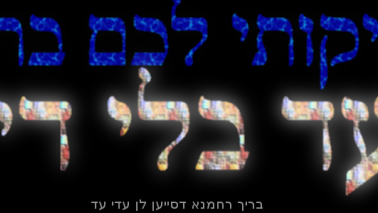Common Misconception: Rosh Hashanah and Yom Kippur
I made a post like this last year, but it has been a year, and I’ve gathered many more followers of this blog since. In addition, I’ve seen mistaken posts about it from other people on the site, so I figured it would be important to point them out. Please spread this to dispel the misconception.
Misconception: (1) Rosh Hashanah is a simply happy day, then you have (2) 10 days of repentance to ask for forgiveness before you are (3) judged on Yom Kippur.
Explanation: 1) You say in the prayers for Rosh Hashanah “on Rosh Hashanah it is written, and on Yom Kippur it is sealed.” As is explained in many places, Rosh Hashanah is the day of judgement. Not just an individual judgement, but also a general judgement of the entire world. The general judgement of the world is explained in kabbalah to mean that G-d sits and evaluates all of creation, and based on the actions of his creations, decides whether or not to continue the creation. If he decides to stop, then everything reverts to nothingness as if it never was. Al Pi Kabbalah, On the night of Rosh Hashanah, the flow of G-dly light that sustains the world stops, as it were. The entire existence runs on fumes until the sounding of the Shofar on Rosh Hashanah morning. For this reason, Rosh Hashanah is a solemn day, a very severe day, and in a lot of ways, a very scary day. The Rosh Hashanah prayers are all about trying to arouse in G-d the will to continue the creation, and not to let it revert to nothingness. As such, it is actually the custom of many to fast and pray in teshuvah on Erev Rosh Hashanah.
2) the “10 Days of Repentance” are not the days when you are supposed to first seek forgiveness and repent, no. Those are the days when you have a chance to try and Undo what was written down on Rosh Hashanah. Think of it as being on Probation. You’re already in deep trouble if you haven’t done anything before then, and you have to try to put on your best behavior in order to undo the sentence. What should you do to prevent that? Do your repentance NOW, before Rosh Hashanah, and then you’ll never get the bad sentence, and you’ll never be put on probation in the first place.
3) There is a saying of the sages, “Where a Ba'al teshuva (penitent) stands, not even a completely righteous person (who has never sinned) can stand.” The level that a person can reach through teshuva is tremendous, and without comparison (if you want to look for a greater explanation, i’ll try to get around to offering a better one, bli neder, or you can look in Derech Mitzvosecha, the chapter titled “Vidui and Teshuva”). The first Yom Kippur was when the Jews were in the Desert, in the Torah. The jews were given the Torah on the 6th of Sivan, and 40 days later, on the 17th of Tamuz, they sinned with the Golden Calf. G-d became angry with them and Moshe went up to the mountain to try to avoid a disaster, and avoided it by 40 days later, on Rosh Chodesh Elul. Then Moshe went back up to the mountain for another 40 days, to obtain the second tablets. All the while, the jewish people were repenting, a very high level of teshuva, and on Yom Kippur, they reached beyond even where they were before… and on Yom Kippur, they received the second Tablets from G-d, a sign that they had been completely forgiven (for something has horrible as actual idol worship right after all the revelations at the giving of the Torah)- and that’s what we celebrate on Yom Kippur. Yom Kippur isn’t a day of judgement. It’s a day of forgiveness. The single most auspicious day of the entire year for forgiveness. If so, why don’t we eat? There is an old saying “On Tisha B'Av, who can eat? On Yom Kippur, who needs to eat?!” - that is, we are at such a high level, the level of ba'alei teshuva, that we are higher than the angels. As such, we are completely removed from physicality, food and otherwise, and are surrounded only by joy, and the feeling of closeness to G-d. And so joyful that you’re supposed to say Kiddush Levana (the blessing of the moon, which we say once a month, which has to be said specifically in a state of joy and happiness) right after Yom Kippur, and many even will do Kiddush Levana before they break their fast. Why are we so joyful then? Because we know that despite everything, we’ve been forgiven.
You should all be written down for a good and sweet year, and on Yom Kippur, sealed for blessing and happiness, and you should lack nothing.


